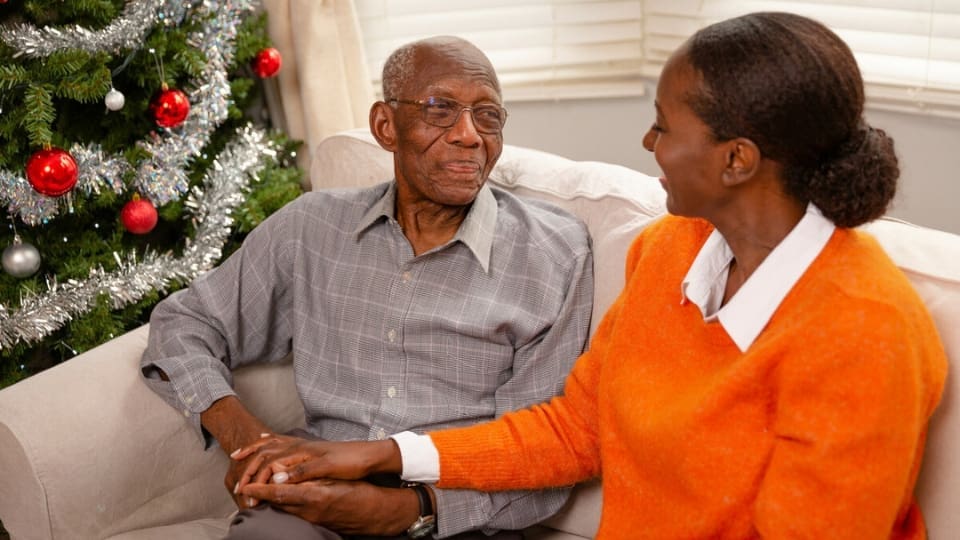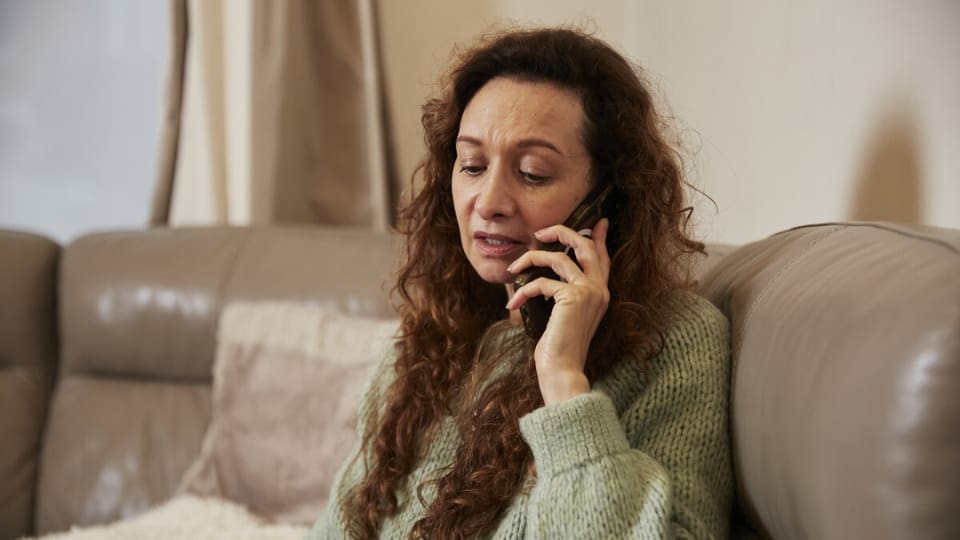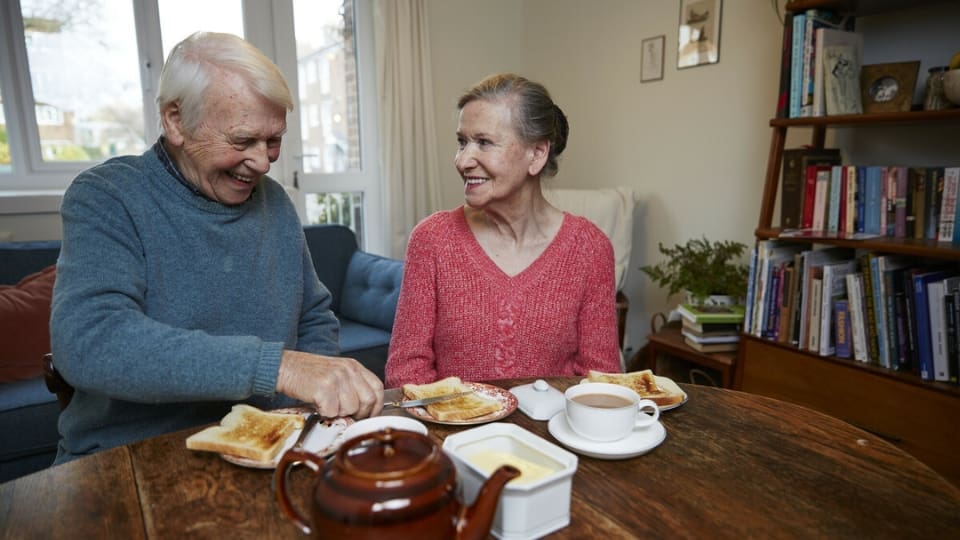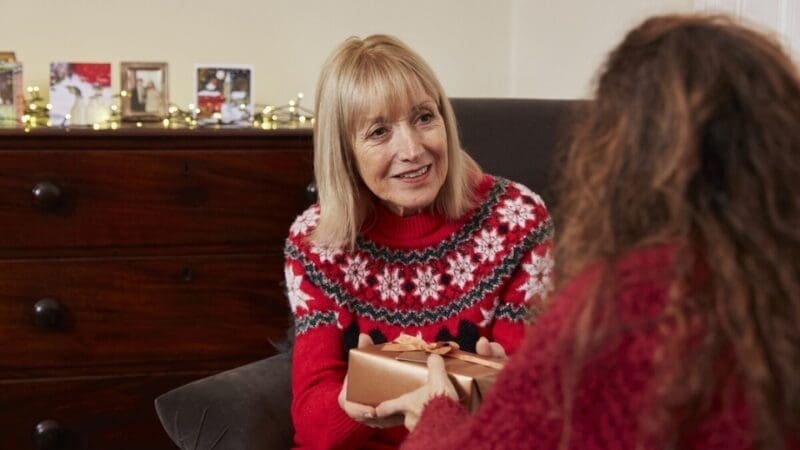
Christmas activities for people living with dementia
Christmas activity ideas for a person with dementia for a fun and engaging time for all the family

Our dementia specialist Admiral Nurses have compiled some top tips to help you and the person you care for make the most of the festive season.
Christmas can be stressful and emotionally challenging, especially for people with dementia and their families. Our dementia specialist Admiral Nurses have put together a list of tips to help you prepare for a peaceful and inclusive festive season.
Vital services like pharmacies, shops, GPs, dentists and mental health services have reduced opening hours over the Christmas period, so to make sure you are not caught out, try to plan ahead so you have everything you might need.
This might include:
If it is difficult to get out, there may be local retailers and voluntary groups that can deliver shopping and other supplies for you. It is a good idea to look into this as soon as possible.

Make sure that any family or friends you will be seeing know that your loved one has dementia. If they already know but have not seen them in a while, you might want to explain that they may notice some significant changes. Let them know the main differences they might see, like increasing memory loss, communication challenges, changes in personality or behaviour, or mobility problems.
Consider the foods that the person with dementia prefers. What are their likes and dislikes? Would they prefer one of their usual meals to a traditional Christmas dinner?
If the person with dementia has a smaller appetite, keep their portions small. You could sit next to them during the meal to see if they are managing and discreetly offer help, if needed – for example, you could talk them through what is on their plate.
Some people with dementia may struggle with cutlery. Depending on their stage of dementia and their motor skills, it may help to cut the person’s food into manageable pieces before serving it, or offer finger food rather than a full cooked meal. Giving them a festive apron to wear at the table is a subtle way to protect their clothing from spills while helping them maintain their dignity and feel respected.
If the person enjoys an alcoholic drink, they should be free to enjoy one, but bear in mind that alcohol may increase disorientation in a person with dementia. It could also interfere with certain types of medication: the GP or a pharmacist can advise you. Alternatively, you could offer the person alcohol-free varieties of beer and wine.

The noise and hubbub of a busy Christmas may be overwhelming for a person with dementia, so try not to overstimulate them. If you can, reduce unnecessary noise like Christmas crackers and loud music, and limit competing noises – for example, turn off the TV if people are talking.
Children can be a great source of enjoyment, but you may need to monitor the amount of time the person with dementia spends with young visitors and look out for signs that they are becoming tired or that noise levels are getting difficult for them to tolerate.
If you can, set aside a quiet room where the person with dementia can have some downtime. You can make an unfamiliar room welcoming by bringing one of the person’s cushions or blankets from their home, spraying a familiar scent or playing their favourite music. If you normally hold one big celebration with lots of people, it may be helpful to split it up into smaller gatherings and spread visits out over the festive period to reduce overwhelm.

People with dementia often benefit from knowing what is going to happen next, so it can be helpful to try to maintain some of their normal routines over Christmas. Do they have meals at a set time? Or a cup of tea in bed every morning? Do they watch a favourite programme at the same time every day? Try to support these routines where you can.

Try to keep the person with dementia involved with activities on the day. When planning occasions, involve them in making decisions if possible so they know what to expect. Make sure they know what is going to happen and check that they are happy with it, but try not to overload them with too many choices or explanations as they may find this overwhelming.
You can also talk to the person with dementia about any adjustments they might need to be made to the usual gatherings. This gives them a chance to voice their needs.
Keep activities short, with a break every 30 to 40 minutes, and make sure that guests are aware that the person with dementia might need to take breaks or have some quiet time.
Look at our advice on inclusive activities for people with dementia to help them feel involved in the celebrations.

At this busy time of year, it can be challenging to look after yourself as a carer. Many people find it comforting to spend time with others in a similar situation, and there may be day centres or support groups in your area that are hosting gatherings over the Christmas period. They may also be holding events for people with dementia to give their carers some respite.
Organisations like Age UK should be able to provide you with details of local events over the festive period. You can also find out what’s on through local social media groups, social services, community centres and libraries, and your GP surgery.
Try to arrange some time out for yourself during this busy period. For example, you could ask other family members or friends to sit with the person you care for so you can take a break for a couple of hours. If this is not possible, try to find time to do something for yourself – you could put on music or a film you love, sit quietly with a book or take a walk on your own or with the person you care for.
If you are considering bringing the person with dementia out of their care home over the festive period, have a few practice runs. This will help you figure out if it is realistic and achievable to take them out, or if it could be too unsettling.
Include the care home staff in your planning and ask them for their advice and how they might be able to support you and the person you care for.
Keep in mind what is manageable for the person with dementia. Allow them to have a nap if they need to. If they are going back to their home at the end of the day, do not leave it too late – try to take them home or to their care home in daylight rather than waiting until it gets dark, when they may be more disorientated.
If you are worried that the person with dementia will not want to leave you at the end of the day, you could say, “Let’s go home now,” rather than, “You have to go home.” If you do things together, it may make it less stressful or frightening for them.
Once you arrive back at the care home, go in with the person and ask the staff to be there to welcome them back. Have an activity ready like having a drink or showing their carer a gift that they received, and ask staff to distract them when it is time for you to leave.

Sometimes, when people know someone has a diagnosis of dementia, they behave differently towards them – for example, they might avoid speaking to the person if they do not know what to say.
Give guests tips beforehand on how to make the person with dementia feel happy and included. Advise them to smile and make eye contact, and to keep conversations clear and simple.
It can be useful to ask guests to take turns talking to the person with dementia to ensure they do not become overwhelmed by trying to follow multiple conversations at once. This also creates opportunities for the person with dementia to feel included throughout the gathering.
You could suggest family and friends read our tips for communicating with a person with dementia in advance. Our guide to talking about dementia with children and young people may also be helpful if you are seeing younger relatives or friends.
Relationships between relatives might have changed. Or you might be worried about how the difference in routine will affect the person with dementia.
If you are entertaining, try not to put too much pressure on yourself to make everything perfect – enjoy the day for what it is, and accept any help offered by others.
Sometimes, spending time together can trigger disagreements between family members about how the person with dementia should be cared for. This can be upsetting, but remind yourself that you are doing the best you can in a challenging situation. Our tips on handling difficult conversations might be helpful in these situations.
Christmas can be particularly difficult if you are spending it alone, for example if the person with dementia has moved into residential care; if relatives and friends are unable to visit; or if you have been bereaved.
Give yourself time to process your feelings, be kind to yourself, and spend your Christmas in whatever way you need to. If friends and family are far away you could try arranging a time to catch up via video call over the holidays.
Learning to live with loss and bereavement can take a long time, and even if you thought you were doing okay, you might experience a dip around a family-oriented time like Christmas. Speak to your GP or other healthcare professional about accessing bereavement counselling or support services, such as Cruse Bereavement Support.
To speak to a dementia specialist Admiral Nurse about managing the festive season or any other aspect of dementia, please contact the free Helpline on 0800 888 6678 (Monday-Friday 9am-9pm; Saturday, Sunday and bank holidays 9am-5pm, every day except 25th December) or email helpline@dementiauk.org
You can also book a phone or video appointment.
Our free, confidential Dementia Helpline is staffed by our dementia specialist Admiral Nurses who provide information, advice and support with any aspect of dementia.
Christmas activities for people with dementia
Christmas gifts for people with dementia
How dementia can affect relationships and roles
Looking after yourself as a carer
Seven tips for handling difficult conversations
What is an Admiral Nurse and how can they help?

Christmas activity ideas for a person with dementia for a fun and engaging time for all the family

Our dementia specialist Admiral Nurses have put together suggestions for appropriate Christmas gifts for people with dementia

We share answers to some common questions that our dementia specialist Admiral Nurses hear on Dementia UK’s Helpline over Christmas and the New Year – and that might help you over the weeks ahead.